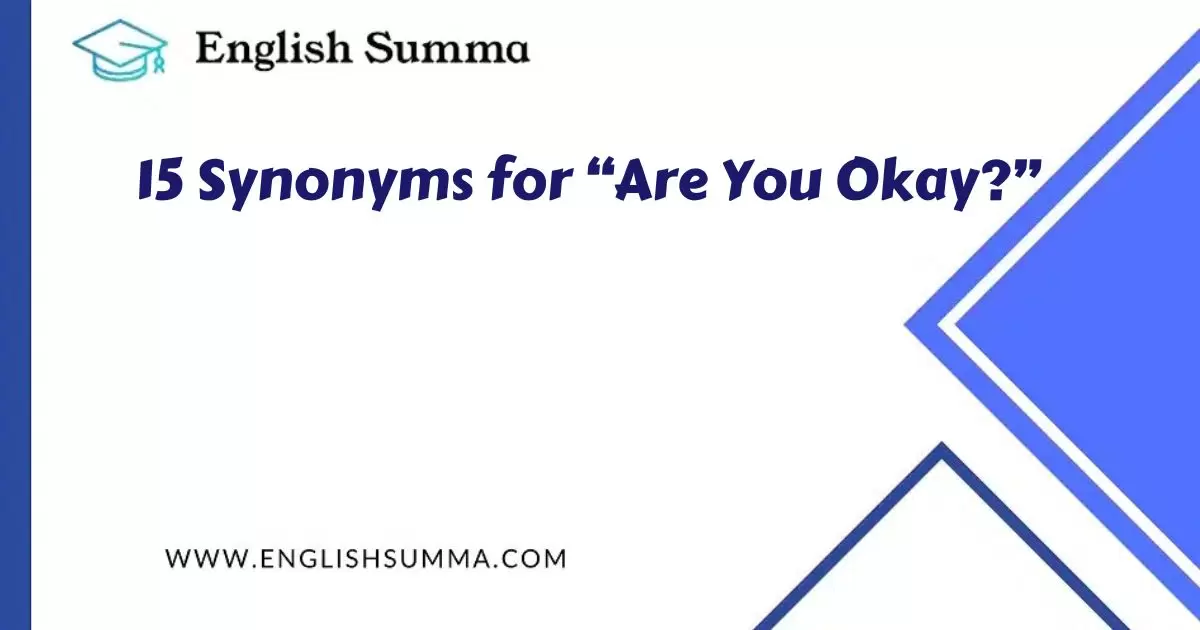In the realm of interpersonal communication, expressing concern for someone’s well-being is not only courteous but also essential for maintaining healthy relationships. One common phrase used to convey this sentiment is “Are you okay?” However, there are numerous ways to phrase this question, each carrying its own nuance and tone. Here, we’ll explore 15 synonyms for “Are you okay?” along with scenario examples to illustrate their usage.
1. How are you feeling?
Scenario Example:
Subject: Checking In
Hi Justin,
I hope this email finds you well. I just wanted to check in and see how you’re feeling. I heard you weren’t feeling your best lately, so I wanted to offer my support. Let me know if there’s anything I can do to help.
Take care, James
Additional Notes: This phrase expresses a genuine interest in the person’s emotional or physical state. It’s often used when you suspect the person might not be feeling their best.
2. Are you alright?
Scenario Example:
Subject: Concerned Friend
Hey Justin,
I noticed you seemed a bit off during our last meeting. Are you alright? If something’s bothering you, know that I’m here to listen. Don’t hesitate to reach out.
Best, James
Additional Notes: This phrase conveys concern and a willingness to provide support. It’s commonly used in informal settings among friends or acquaintances.
3. Is everything okay?
Scenario Example:
Subject: Quick Check-In
Hi Justin,
I just wanted to touch base and see how you’re doing. Is everything okay on your end? If there’s anything going on, feel free to share. I’m here to help in any way I can.
Take care, James
Additional Notes: This phrase is versatile and can be used in various contexts, from casual conversations to more formal settings. It implies a broader concern beyond just the person’s immediate well-being.
4. Is everything all right?
Scenario Example:
Subject: Just Checking
Hey Justin,
I noticed you’ve been quiet lately. Is everything all right? If there’s anything on your mind, know that I’m here to lend an ear. Take care of yourself.
Warm regards, James
Additional Notes: This phrase is similar to “Is everything okay?” but may convey a slightly heightened level of concern, particularly if the situation seems more serious.
5. How are you holding up?
Scenario Example:
Subject: Checking In During Busy Times
Hi Justin,
I know you’ve been swamped with work lately. How are you holding up? Remember to take breaks and prioritize your well-being amidst the hustle and bustle. Let me know if there’s anything I can do to ease your load.
Best, James
Additional Notes: This phrase is often used in situations where the person is facing significant challenges or stress. It acknowledges their struggles while offering support.
6. Are you managing fine?
Scenario Example:
Subject: Supportive Check-In
Hey Justin,
I know things have been hectic for you lately. Are you managing fine? If you need any assistance or just someone to talk to, I’m here for you. Take care and remember to prioritize self-care.
Warm regards, James
Additional Notes: This phrase suggests that the person might be facing difficulties but is handling them adequately. It’s a supportive way to check in on someone’s well-being.
7. How’s everything going?
Scenario Example:
Subject: Quick Update
Hi Justin,
Just wanted to touch base and see how’s everything going on your end. If there’s anything you need from my end or if you want to chat, feel free to reach out. Take care!
Best regards, James
Additional Notes: This phrase is commonly used in casual conversations or professional settings to inquire about the person’s overall situation or progress.
8. Are you feeling okay?
Scenario Example:
Subject: Concerned Inquiry
Hey Justin,
I noticed you seemed a bit off during our last conversation. Are you feeling okay? If there’s anything bothering you, please know that you can talk to me about it. Take care of yourself.
Warm regards, James
Additional Notes: This phrase directly addresses the person’s emotional or physical state and expresses concern for their well-being.
9. Are you managing well?
Scenario Example:
Subject: Checking In
Hi Justin,
With everything going on lately, are you managing well? If you need any assistance or support, don’t hesitate to ask. Take care and prioritize self-care.
Best regards, James
Additional Notes: This phrase acknowledges that the person may be facing challenges but suggests confidence in their ability to cope. It offers support while respecting their resilienced.
Don’t miss read out this Professional Ways to Say “Thank You for Your Understanding”
10. Are you doing okay?
Scenario Example:
Subject: Checking In
Hey Justin,
Just wanted to reach out and see are you doing okay? If there’s anything I can do to help or if you need someone to talk to, I’m here for you. Take care and know that you’re not alone in this.
Warm regards, James
Additional Notes: This phrase is straightforward and commonly used in various contexts to express concern and offer support.
11. How are you?
Scenario Example:
Subject: Just Checking In
Hi Justin,
I haven’t heard from you in a while and wanted to reach out to see how are you? If there’s anything on your mind or if you need someone to talk to, know that I’m here for you. Take care.
Warm regards, James
Additional Notes: This phrase is simple and direct, inviting the person to share their current state without specifying any particular aspect of well-being.
12. What’s up?
Scenario Example:
Subject: Quick Chat
Hey Justin,
Just wanted to drop you a quick message to see what’s up. If you have a moment, let’s catch up. If not, no worries. Take care and talk soon.
Best, James
Additional Notes: While commonly used as a casual greeting, “What’s up?” can also serve as an informal way to check in on someone’s overall status.
13. How’s life treating you?
Scenario Example:
Subject: Friendly Check-In
Hi Justin,
I hope this email finds you well. I wanted to check in and see how’s life treating you lately. If there’s anything exciting happening or if you just need to vent, feel free to share. Take care!
Warm regards, James
Additional Notes: This phrase acknowledges the ups and downs of life and invites the person to share their experiences, whether positive or negative.
14. Are you doing well?
Scenario Example:
Subject: Reaching Out
Hey Justin,
I’ve been thinking about you and wanted to check in to see are you doing well? If there’s anything I can do to support you or if you just want to chat, let me know. Take care and stay strong.
Best, James
Additional Notes: This phrase expresses concern for the person’s overall well-being and acknowledges that they may be facing challenges.
15. How have you been?
Scenario Example:
Subject: Catching Up
Hi Justin,
It’s been a while since we last spoke, and I’ve been wondering how have you been? If you have some time, let’s catch up soon. Take care of yourself in the meantime.
Warm regards, James
Additional Notes: This phrase invites the person to share updates about their life since the last interaction and implies a desire to reconnect.
Pros and Cons:
Pros:
- Variety: Having a diverse range of synonyms allows for flexibility in communication, catering to different preferences and situations.
- Friendliness: Some phrases, like “What’s up?” or “How’s life treating you?” can inject a casual and friendly tone into the conversation, making the check-in feel more relaxed.
- Engagement: Inviting the person to share updates about their life can foster deeper connections and strengthen relationships over time.
Cons:
- Informality: While informal phrases can be suitable for close relationships or casual settings, they may not always be appropriate for professional or formal contexts.
- Interpretation: Depending on the relationship dynamics and cultural norms, some phrases may be interpreted differently, leading to potential misunderstandings.
- Context Sensitivity: Choosing the right phrase requires consideration of the context, relationship dynamics, and the recipient’s preferences, which may vary from one interaction to another.

Meet Steven Smith, the driving force behind “English Summa.” Armed with a Bachelor’s Degree in Linguistics and a passion for teaching, Steven is dedicated to unraveling language intricacies for eager minds. Join him on a journey of linguistic discovery through Language Odyssey—a space where education meets inspiration, and the beauty of language unfolds.

